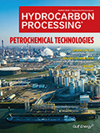Desulfurization
Industry Pioneers: Polymer science, catalytic cracking, petrochemicals and EPC
Waldo Semon was an American chemist whose detour with assigned laboratory research at B. F. Goodrich led to the development of vinyl—the second best-selling plastic in the world.
Construction
Eni plans to launch its 3.4-MMtpy FLNG vessel offshore Mozambique this year. The Coral Sul FLNG vessel is being built by Samsung Heavy Industries.
Corrosion: Maintaining profitability with opportunity crudes while mitigating naphthenic acid corrosion
Refiners are asked to produce products within ever tighter margins in a changing industry.
Hydrocarbon Processing's Top Project Awards
Details on high-impact refining and petrochemical projects, as chosen by <i>HP</i> editors and readers
Hydrocarbon Processing 2021 Awards FINALISTS
<i>Hydrocarbon Processing</I>, the downstream processing sector’s leading technical publication for nearly 100 yr, has announced the finalists for its fifth annual <i>HP</i> Awards, which celebrate innovative technologies and people that have been instrumental in improving facility operations over the past year.
Implementation of advanced level control techniques in refinery operations
Plant performance depends on stable operations, with steady feed, product flow, temperature and pressure control as per process requirements.
Editorial Comment: Refining’s evolution: Technology driving innovation
Since its inception in 1922, <i>Hydrocarbon Processing</i>—originally called <i>Petroleum Refiner</I> when first published—has focused on delivering the latest refining technologies to readers around the world.
Construction
Ulsan PP Co., a JV between PolyMirae Co. Ltd. (a partnership between LyondellBasell and DL Chemical) and SK Advanced, commissioned its 400,000-tpy polypropylene (PP) facility in June.
Oil refinery/petrochemical integration in a CO2-constrained world—Part 2
Petrochemical demand will increase with gross domestic product, while the demand for motor fuels will only show modest growth and may even decline in certain regions, given environmental/legislative pressures and the introduction of battery-powered electric vehicles.
MAA refinery—Bunker fuel oil challenge: Stable and compatible VLSFO production
Studies have been conducted on strategies for bunker fuel oil (BFO) production with reduced sulfur and catalytic fines concentration limits.

- China's Wanhua Chemical starts operation at new east China cracker 4/4
- Brookfield Infrastructure announces the acquisition of Colonial Enterprises for $9 B 4/4
- PBF restarts some units at Martinez refinery after February fire; fire-damaged units remain shut 4/4
- Japan to curb gasoline prices from June to cushion U.S. tariff blow 4/4
- Evonik presents innovative "Debonding on Demand" concept for more sustainable bonding 4/3
- Oil, gas and refined product imports exempted from Trump’s sweeping tariffs 4/3




